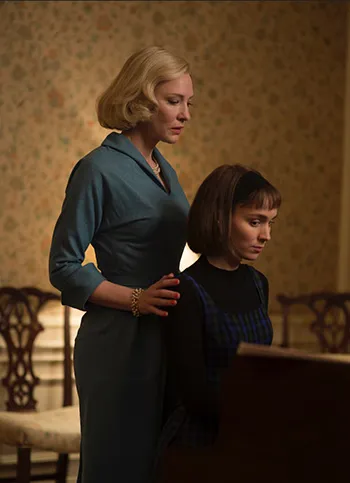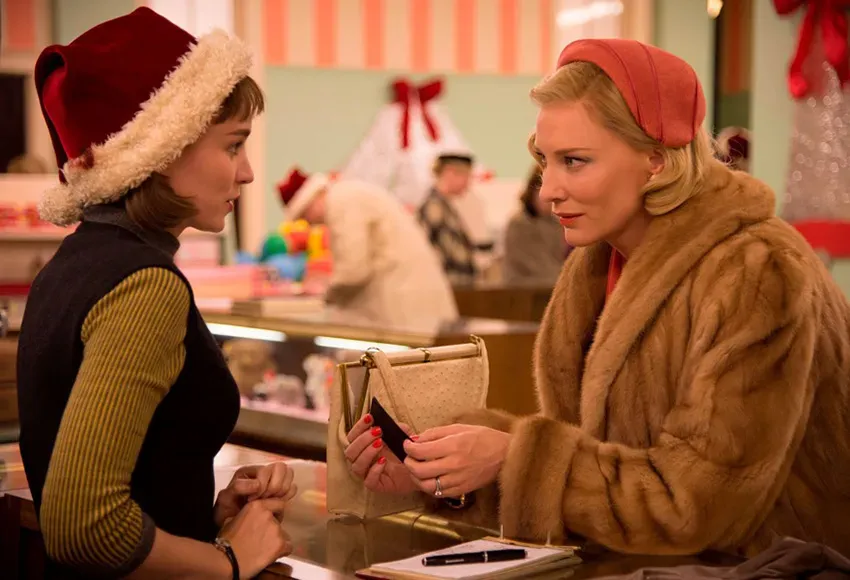CAROL
Netflix
Content warning: Homophobia
Carol. Oh, Carol. May we all mourn the loss of our dumbest adolescent crushes with as beautiful cinematography as Todd Haynes's queasy mess.
Like the book (reviewed last issue), there's a distinct edge to this movie. It's supposed to be a love story, but it's shot like a suspense film. The eponymous Carol is played like a Hitchcock villain, seen at a distance and gone an averted gaze later. The whole thing has an ominous weight, the shadowy edges of the frame closing in claustrophobically. It's winter, but there's no cozy glow, only the cold drip of an overbearing rain that traps us inside smoky bars and burdensome coats.
The beginning of Carol roars in with a rattle of metal and clank of machinery. The screen is black until the first jump scare. "Weinstein Productions." I gasped.
The time period this movie came from is so recent yet so far away. It was two years before the #MeToo movement took down this monster of movie producer and just a few months after Obergefell v. Hodges. Carol seems like the union of these two events, a celebration that Queers can have just as terrible of a relationship as the straights.
We meet Therese and Carol, who both talk like they have a sexy and contagious form of asthma. Carol goes to Therese's shop counter and asks for a doll. In what I think may be the only joke in the movie, Therese's eyes flit to Carol's when she says the requested doll "wets herself." I think this is supposed to be a sex joke? It's utterly out of character but, damn, I love it. Therese convinces Carol to instead buy a train set for her daughter. Feminism, I guess.
They go to a bar. Carol's only question for Therese is whether she likes her boyfriend and then invites Therese to her house. Their whole relationship will follow this stuttering rhythm. Carol will make a massive jump ahead, then cut the whole thing off, then leap again. She invites Therese on a road trip after throwing her out of her house. Carol then abandons Therese on the road and leaves a letter that declares she's breaking up with Therese for her own good.
Months later, Carol just as arrogantly struts back into Therese's life. At their first reunion dinner, Carol invites Therese to move in and confesses her love. Do they talk about this? Does Therese find her own voice and start stating her needs or desires? Of course not. Therese does her signature waffle, refuses Carol's dinner invitation, goes to her own party, then leaves and runs back to Carol.
It would have been nice if Therese had shown a hint of joy here. Instead she stumbles frantically in a drunk wobble of handycam toward Carol's table where she stares at Carol, unsmiling and unblinking. Carol's eyes flick up and she smiles, a smug snake eyeing its mousy prey.

Following the book, the relationship is strange – beyond the self-centered divorcee spiraling out – and that's the infantilization of Therese, who is driven around in other people's cars, naps, and gets tucked in by Carol. There's also a strange parallel between Therese and Rindy, Carol's daughter. They have identical haircuts and are often in parallel costuming, in plaid skirts or color-matched hats. Carol's questions also veer toward Therese's childhood, asking her what toys she wanted or tracing a photo of Therese as a child that Therese, inexplicably, has hanging on her wall. Like the book, the choice is clear: Carol can choose to be either a mom or a Queer. Therese is a Freudian pseudo-replacement.
It is argued that Carol has a "happy" ending, but I prefer the breakups of pulp like Spring Fire. In the regressive way that's paralleled in many struggles, victory is put into the terms of the existing winners. Women win when they can be as exploitative as the next CEO. Queers win when we can trap a partner into the same toxic but long-lasting relationships as the patriarchy.
Overall, Carol is reminiscent of a time that we, as Queers, still struggle with, when we were told we were degenerates. There's an allure to romanticizing this era of the Queer as criminal, when the only way to survive was to cheat on a spouse, lie to our friends, and sneak away into surreptitious trysts in hazy hotel rooms.
That's what Carol feels like to me. Like it's trying to dress up the carcass of a time I don't feel the need to pretend was glamorous. The glitz is like stage makeup used to mask the greenish pallor of a corpse, with lurid reds like roses upon a bier, an alluring display to distract from the pervasive stench of something not quite right.


